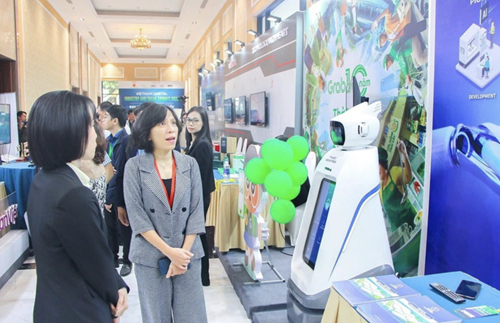Digital transformation is an integral part of the approved National E-commerce Development Plan for the 2021-2025 period. According to the plan, e-commerce is identified as a pioneering sector applying digital technology to modernize production systems and distribution models, improve business efficiency, and create sustainable growth momentum for exports.
    |
 |
|
(Photo for illustration: Vietnam E-commerce and Digital Economy Agency) |
To realize these goals, it is essential to establish and develop a comprehensive e-commerce ecosystem from domestic to international markets, and connect producers with effective international distribution channels, as no single business or organization can independently handle all the diverse aspects of e-commerce, including technology, logistics, finance, policy, and the capacity to access international markets.
Therefore, the e-commerce ecosystem needs to be built as a multidimensional interactive network, where key stakeholders, including regulatory bodies, technology solution providers, exporters, logistics and financial service providers, consumers, as well as training institutions and media networks, collaborate, support, and amplify one another. This synergy will create a robust system capable of self-adjustment and sustainable development.
To promote a sustainable e-commerce ecosystem in Vietnam, the IDEA is actively implementing a range of concrete action programs. Key priorities include improving the legal environment, enhancing capacity through training programs and SME support initiatives, and developing infrastructure and technology with solutions such as cashless payments, smart logistics, and AI. Another key part of the plan is accelerating international cooperation and cross-border e-commerce to explore and expand export channels to global markets.
A key upcoming event is the Vietnam E-commerce and Digital Technology Application Forum 2025, scheduled for September 4-6 in Ho Chi Minh City, as part of the Vietnam International Sourcing 2025.
With the coordination of over 60 Vietnamese trade offices abroad, the forum is expected to welcome more than 300 international business delegations from various countries, which will come to seek opportunities for partnerships, import of Vietnamese goods, and investment connections.
The presence of a large number of international buyers and investors promises great opportunities for Vietnamese businesses to expand their export markets and deepen their participation in the global supply chain, thereby enhancing competitiveness.
According to Bui Huy Hoang, Deputy Director of the Centre for E-commerce and Digital Technology Development (eComDX) under the IDEA, global e-commerce is not simply about setting up an online store, but a complex game that requires a mindset focused on gradually mastering the digital value chain.
For cross-border e-commerce to become a long-term growth lever, Vietnamese enterprises need to be more proactive in directly approaching international markets rather than relying solely on existing platforms, he said. Currently, many Vietnamese businesses still struggle, stopping at merely listing products on marketplaces without a well-structured strategy for building databases, operations, marketing, and cross-border after-sales services.
In the context of rapidly advancing technology, Vietnamese enterprises need support in building internal capacities to independently manage, optimize, and measure the effectiveness of their cross-border e-commerce activities, rather than merely “participating” without truly “taking ownership,” advised Hoang.
Source: VNA